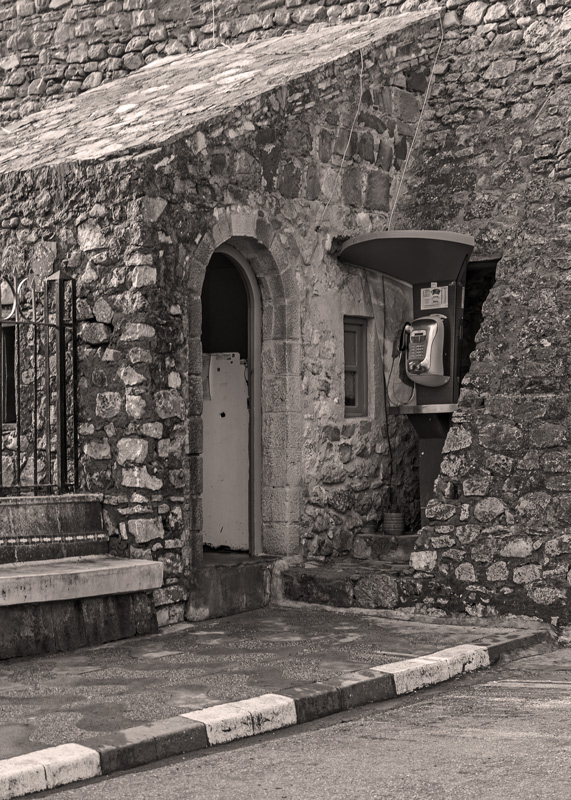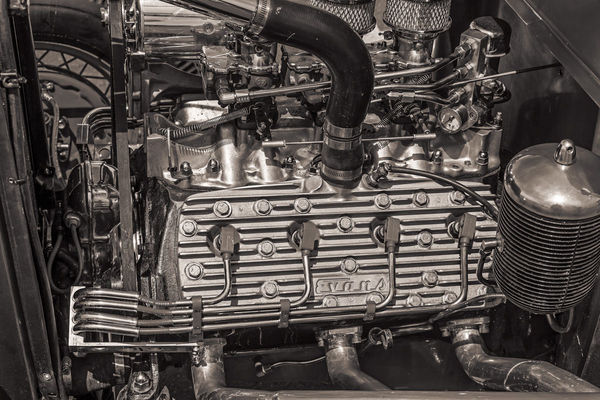Color VS Black and White
Jan 30, 2014 08:21:16 #
I go to many photo exhibitions. I see a lot of museums and galleries hang Black and White and Sepia photos.
Question: When do you photogs think about that? Is it sometimes better to go Black and White from an artistic or technical standpoint and why?
Question: When do you photogs think about that? Is it sometimes better to go Black and White from an artistic or technical standpoint and why?
Jan 30, 2014 08:38:30 #
In my case I do not think about conversions when I am using my digital cameras. All files are not necessarily good for conversion but some of them could turn spectacular when converted.
Black and white photography as you know is monochrome. It has many shades of gray and has no color to distract the mind. It has always been the art media and the reason why you find b&w work so often at museums and galleries.
I think that Ansel Adams made significant and important contributions to the art of b&w photography and if you ask me I would say that many of the tonalities present in a printed fiber base paper from a film negative are not that easy to duplicate with a conversion.
We have better software for conversions and we can do today what was impossible to do in the optical darkroom in the past.
Very good conversions are possible, especially when the file is printed by a professional lab.
You are not going to find many galleries that will turn down a good b&w print.
Black and white photography as you know is monochrome. It has many shades of gray and has no color to distract the mind. It has always been the art media and the reason why you find b&w work so often at museums and galleries.
I think that Ansel Adams made significant and important contributions to the art of b&w photography and if you ask me I would say that many of the tonalities present in a printed fiber base paper from a film negative are not that easy to duplicate with a conversion.
We have better software for conversions and we can do today what was impossible to do in the optical darkroom in the past.
Very good conversions are possible, especially when the file is printed by a professional lab.
You are not going to find many galleries that will turn down a good b&w print.
Jan 30, 2014 08:45:34 #
Ellen101 wrote:
I go to many photo exhibitions. I see a lot of museums and galleries hang Black and White and Sepia photos.
Question: When do you photogs think about that? Is it sometimes better to go Black and White from an artistic or technical standpoint and why?
Question: When do you photogs think about that? Is it sometimes better to go Black and White from an artistic or technical standpoint and why?
Short answer: It depends on the effect you are going for and if done properly the result can be spectacular.
I suggest you check out this thread:
http://www.uglyhedgehog.com/t-179044-1.html
It's an existing discussion of your topic. Also has some excellent photos in it.
IMHO a good B&W shot can be a real show stopper. I would love to be able to produce some of the results displayed by various members.
Jan 30, 2014 09:40:51 #
Welcome to UHH, Ellen!
Black and white film photography was my first love. We were taught to compose for texture, shapes and light. That is a different approach than shooting an image "in color" as it were - and later on wondering whether it would be interesting - or better - converted.
Here are two more topics to read. Lots of great input by our members:
http://www.uglyhedgehog.com/t-81475-1.html
http://www.uglyhedgehog.com/t-169242-1.html
Black and white film photography was my first love. We were taught to compose for texture, shapes and light. That is a different approach than shooting an image "in color" as it were - and later on wondering whether it would be interesting - or better - converted.
Here are two more topics to read. Lots of great input by our members:
http://www.uglyhedgehog.com/t-81475-1.html
http://www.uglyhedgehog.com/t-169242-1.html
Jan 30, 2014 09:57:33 #
Jan 30, 2014 10:04:20 #
Thank you ...actually I am returning after a break. I was an active member here for a few months. You all advised me to get the Nikon D5100 which I did. I love the ease of the camera now I'm hunting for a compatible telephoto lens.
Any Ideas ...please tell me
You guys are the best!
Any Ideas ...please tell me
You guys are the best!
LFingar wrote:
BTW, welcome to the Hog!
Jan 30, 2014 10:40:16 #
Photography began as a black-and-white medium. Not even a hundred years ago, Kodak introduced color film.
Part of the attraction of a black-and-white photograph lies in its appeal to the visual sense minus color (apart from black, white, and shades of grey). Black-and-white photographs depend on tonality, texture, contrast, and shape for their visual statement, which elements become emphasized without the distraction of color.
Interestingly, without the distraction of color, a black-and-white photograph seems to convey more information to the visual sense, and more economically because direct. A variety of papers support the medium of black-and-white photography.
From my reading and from my experience in doing black-and-white photography, I note the diverse methods of working in this medium as part of the history of photography.
Today, a software program like Silver Efex Pro 2 embodies nearly all the effects of black-and-white photography, including many of the traditional black-and-white films as effects. The tones alone, with their adjustment sliders, offer many variations for best presentation of a given photograph.
Part of the attraction of a black-and-white photograph lies in its appeal to the visual sense minus color (apart from black, white, and shades of grey). Black-and-white photographs depend on tonality, texture, contrast, and shape for their visual statement, which elements become emphasized without the distraction of color.
Interestingly, without the distraction of color, a black-and-white photograph seems to convey more information to the visual sense, and more economically because direct. A variety of papers support the medium of black-and-white photography.
From my reading and from my experience in doing black-and-white photography, I note the diverse methods of working in this medium as part of the history of photography.
Today, a software program like Silver Efex Pro 2 embodies nearly all the effects of black-and-white photography, including many of the traditional black-and-white films as effects. The tones alone, with their adjustment sliders, offer many variations for best presentation of a given photograph.
Ellen101 wrote:
I go to many photo exhibitions. I see a lot of museums and galleries hang Black and White and Sepia photos.
Question: When do you photogs think about that? Is it sometimes better to go Black and White from an artistic or technical standpoint and why?
Question: When do you photogs think about that? Is it sometimes better to go Black and White from an artistic or technical standpoint and why?
Telephone Booth, Morocco

Hot Rod Motor, Chandler Airport, Arizona

Jan 30, 2014 11:50:43 #
Ellen101 wrote:
Thank you ...actually I am returning after a break. I was an active member here for a few months. You all advised me to get the Nikon D5100 which I did. I love the ease of the camera now I'm hunting for a compatible telephoto lens.
Any Ideas ...please tell me
You guys are the best!
Any Ideas ...please tell me
You guys are the best!
I suggest you give some thought to just what you want to photograph, if you haven't already, before you buy any lenses. Indoors, outdoors, distances, what type of lighting you expect to encounter, still or moving subjects, etc. Generally speaking, the opinion seems to be that a prime lens, which is a lens with a fixed focal length, will give better results if it will work for your situation. A zoom is more versatile but you often end up trading off some image quality, although there are some excellent quality zooms available. A lot depends on your budget and expectations. In addition to the recommendations you will no doubt receive from other members I suggest you check out retail sites like Adorama and B&H so that you can read the customer reviews of the different lenses. I currently have 2 zooms and will soon be buying a 3rd. A 17-40 for indoors or tight areas, a 70-300 for those longer outdoor shots and soon a 24-70 for a walk around lens. They are, of course, usable for other situations, but that is my general use for them.
Jan 30, 2014 11:52:51 #
anotherview wrote:
Photography began as a black-and-white medium. No... (show quote)
Love that Ford flathead. Just about the smoothest running V-8 ever built.
Jan 30, 2014 13:29:47 #
Thank you and I will have to think about that because I need very good image quality. My aim is to produce images clear and sharp enough to put into an 11 x 18 frame.
LFingar wrote:
I suggest you give some thought to just what you w... (show quote)
Jan 30, 2014 15:26:26 #
Ellen101 wrote:
Thank you and I will have to think about that because I need very good image quality. My aim is to produce images clear and sharp enough to put into an 11 x 18 frame.
That's a somewhat different matter then just what lens will suit your needs best. Sharpness is affected by a number of things. The abilities of your camera and lens are of course important but so are things like your technique and post processing. Are you using a tripod? Remote release? Mirror lock-up? Are you shooting at a shutter speed that negates the need for those things? There are a lot of little things to help get sharpness and I certainly don't know all of them. How much you can enlarge a photo is going to depend on things like the megapixels of your camera, how much cropping you do and the overall picture quality. I know a little bit about a number of things but I am definitely no expert. Fortunately, there are plenty of members of the Hog who are. This seems to be a serious quest of yours so I suggest you invest in some books on the subject or any of the many on-line tutorials. Scott Kelby is one author I like. He writes with an easy going humorous style.
Jan 30, 2014 16:41:43 #
Sadly a lot convert pics to B&W as it seems to be a bit of a "fad". Good B&W images can (and are) be very striking but some with great colour are only ruined...
Jan 30, 2014 17:04:45 #
mwsilvers
Loc: Central New Jersey
Ellen101 wrote:
I go to many photo exhibitions. I see a lot of museums and galleries hang Black and White and Sepia photos.
Question: When do you photogs think about that? Is it sometimes better to go Black and White from an artistic or technical standpoint and why?
Question: When do you photogs think about that? Is it sometimes better to go Black and White from an artistic or technical standpoint and why?
Depending on the subject matter and the photographer's intent, B&W often lets you focus on line, shape, texture and contrast without the distraction of color.
Jan 30, 2014 17:19:34 #
SX2002 wrote:
Sadly a lot convert pics to B&W as it seems to be a bit of a "fad". Good B&W images can (and are) be very striking but some with great colour are only ruined...
GOOD B&W images fit a 'classic' mold and are not easy to create.
Conversion to B&W is somewhat of a 'fad' or 'craze' that goes around every so often.
I "see" in color, so rarely to I take an image where I think I want it monochrome.
Jan 30, 2014 17:22:52 #
Wahawk wrote:
GOOD B&W images fit a 'classic' mold and are not easy to create.
Conversion to B&W is somewhat of a 'fad' or 'craze' that goes around every so often.
I "see" in color, so rarely to I take an image where I think I want it monochrome.
Conversion to B&W is somewhat of a 'fad' or 'craze' that goes around every so often.
I "see" in color, so rarely to I take an image where I think I want it monochrome.
Precisely... :thumbup:
If you want to reply, then register here. Registration is free and your account is created instantly, so you can post right away.






